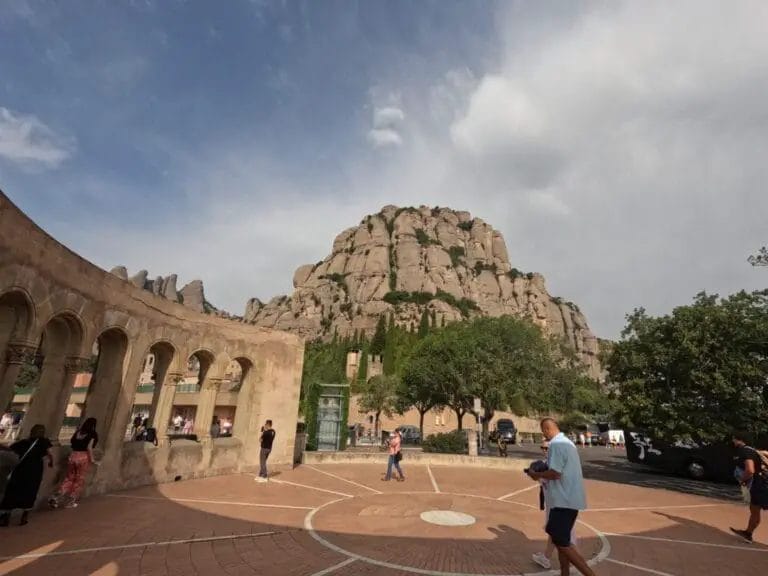How Much Does a Trip to Spain Cost? Comprehensive Guide
Dreaming of a trip to Spain? Wondering about the costs involved? Look no further! In this comprehensive guide, we’ll break down everything you need to know about budgeting for your Spanish adventure.
In this article, we will explore the various elements that contribute to the overall cost of a trip to Spain and provide practical tips to help you plan accordingly.
Read further our Trip to Spain Cost Guide.
How much does it cost to travel to Spain?

On average, a budget traveler’s cost of visiting Spain for a week is €760. If you’re on an ultra-budget, you can get by in Spain for a week with €550 on average. The average cost of a one-week mid-range trip is €1,000, while a luxury Spain trip starts from €2,100 on average.
Sample Budget for a Trip to Spain
1. Airfare:
- Budget Option: €300 – €500 (round trip)
- Mid-range Option: €500 – €800 (round trip)
- Luxury Option: €800 – €1300+ (round trip)
Tips for Saving Money:
- Book flights well in advance to secure lower fares.
- Be flexible with travel dates and consider flying during off-peak seasons.
- Explore budget airlines or look for deals and promotions.
2. Accommodation:
- Hostels: €15 – €40 per night
- Mid-range Hotels: €60 – €120 per night
- Luxury Hotels: €150 – €400+ per night
Tips for Saving Money:
- Consider staying in hostels or budget-friendly guesthouses.
- Use accommodation booking platforms to compare prices and find discounts.
- Look for alternative lodging options such as vacation rentals or homestays.
3. Transportation:
- Local Transportation: €1 – €2 per ride (metro/bus)
- Intercity Trains: €20 – €80+ (depending on distance and class)
- Car Rental: €25 – €60 per day (excluding fuel and insurance)
Tips for Saving Money:
- Utilize public transportation whenever possible instead of taxis or private cars.
- Purchase multi-day or unlimited travel passes for metro and bus networks.
- Consider carpooling or sharing rides for longer journeys.
4. Meals:
- Budget Eateries/Tapas Bars: €4 – €12 per meal
- Mid-range Restaurants: €12 – €25 per meal
- Fine Dining/Luxury Restaurants: €25 – €80+ per meal
Tips for Saving Money:
- Opt for budget-friendly eateries, local markets, and street food vendors.
- Share meals or order smaller portions to reduce costs.
- Take advantage of lunch specials or set menus offered by restaurants.
5. Activities:
- Free Attractions: €0 – €15 (e.g., parks, museums with free entry)
- Guided Tours/Activities: €15 – €80+ (depending on duration)
- Special Events/Shows: €20 – €150+ (concerts, flamenco shows)
Tips for Saving Money:
- Research free or low-cost attractions and activities in advance.
- Take advantage of student discounts, group rates, or combination tickets.
- Look for cultural festivals or events that offer free entertainment and activities.
2. Factors Affecting the Cost of a Trip to Spain
Several factors come into play when determining the cost of a trip to Spain. By considering these aspects, you can gain insight into how to allocate your budget effectively.
Season and Time of Travel
The time of year you choose to visit Spain can significantly impact your expenses. High tourist seasons, such as summer and major holidays, tend to be pricier due to increased demand. Conversely, traveling during the off-peak seasons can offer more affordable rates for flights, accommodations, and activities.
Transportation Expenses

Transportation costs, including airfare and local travel, make up a significant portion of your overall expenses. Researching and booking flights well in advance, comparing prices from different airlines, and being flexible with your travel dates can help you secure the best deals. Additionally, understanding the local transportation options in Spain, such as trains, buses, and metros, can help you navigate the country efficiently without breaking the bank.
Accommodation Options
The type of accommodation you choose plays a vital role in your trip’s cost. Spain offers a wide range of options, including luxury hotels, budget-friendly hostels, vacation rentals, and homestays. Depending on your preferences and budget, selecting the right accommodation can help you save money without compromising comfort and convenience.
Food and Dining Expenses
Experiencing Spain’s culinary delights is an essential part of any trip, but it’s crucial to budget for food and dining expenses. While dining out can be a memorable experience, it’s also possible to find affordable eateries and tapas bars that offer delicious local cuisine at reasonable prices. Exploring local markets and preparing some meals yourself can also help reduce costs.
Sightseeing and Activities
Visiting famous attractions and engaging in various activities are integral to your Spanish adventure. However, entrance fees, guided tours, and activity costs can quickly add up. Researching free or low-cost attractions, taking advantage of discounts, and planning your itinerary in advance can help you enjoy the highlights of Spain without overspending.
3. Airfare and Transportation Costs
Finding affordable flights to Spain is essential to keep your trip cost-effective. Here are some tips to help you secure the best deals:
- Be Flexible with Travel Dates: Searching for flights across a range of dates and being open to adjusting your travel plans can help you find cheaper fares.
- Book in Advance: Booking your flights several months ahead can often lead to significant savings.
- Consider Alternate Airports: Exploring nearby airports or secondary cities in Spain can sometimes offer lower airfare options.
- Opt for Budget Airlines: Many low-cost carriers operate flights to and within Spain, offering competitive fares.
- Sign Up for Price Alerts: Utilize travel websites and apps that provide price alerts to stay informed about any changes in flight prices.
Once in Spain, there are various transportation options available for getting around. Utilizing public transportation like trains, buses, and metros can be cost-effective and efficient. Alternatively, renting a car can provide more flexibility, but it’s important to factor in associated costs such as fuel, tolls, and parking fees.
4. Accommodation Expenses
Choosing the right accommodation based on your preferences and budget is crucial. Consider the following options:
- Hotels: Spain offers a wide range of hotels catering to different budgets. Look for deals, compare prices, and read reviews to find suitable options.
- Hostels: Ideal for budget travelers, hostels provide affordable dormitory-style or private room accommodations, often with communal facilities.
- Vacation Rentals: Renting an apartment or house can be a cost-effective option, especially for families or larger groups.
- Homestays: Immerse yourself in the local culture by staying with a Spanish family, which can provide a unique and budget-friendly experience.
When choosing accommodation, factors such as location, amenities, and reviews should be taken into account to ensure a comfortable stay within your budget.
5. Food and Dining Costs
Spanish cuisine is renowned for its flavors and diversity. While dining out can be a delightful experience, it’s important to consider your budget. Here are some tips to help manage your food expenses:
- Explore Local Markets: Visit local markets to purchase fresh produce, snacks, and ingredients for meals. This can be an excellent way to immerse yourself in the culture and save money.
- Try the Menu del Día: Many restaurants offer a fixed-price menu for lunch, known as “Menu del Día,” which includes multiple courses at a reasonable price.
- Sample Street Food: Street food vendors and tapas bars offer delicious and affordable options to taste authentic Spanish dishes without breaking the bank.
- Cook Your Own Meals: If your accommodation provides kitchen facilities, consider cooking some of your meals to save money.
By balancing dining out with budget-friendly options, you can savor the local cuisine without overspending.
6. Sightseeing and Activities Expenses
Spain boasts numerous attractions and activities that cater to diverse interests. Here’s how you can manage your sightseeing expenses effectively:
- Research Free and Low-Cost Attractions: Many museums, parks, and landmarks offer free admission or discounted rates on certain days. Researching and planning your visits accordingly can help you save money.
- City Tourist Cards: Consider purchasing city tourist cards, which often provide discounted or free access to attractions, public transportation, and other perks.
- Opt for Guided Walking Tours: Some cities offer free or low-cost guided walking tours, providing insightful experiences while exploring the city’s highlights.
- Balance Paid and Free Activities: Mix paid attractions with free activities like exploring local neighborhoods, enjoying public parks, or attending cultural events.
By strategically planning your sightseeing itinerary, you can make the most of your trip while staying within your budget.
7. Miscellaneous Expenses
In addition to the major cost factors mentioned above, several miscellaneous expenses should be considered when budgeting for your trip to Spain:
- Travel Insurance: It’s essential to have adequate travel insurance to protect against unforeseen circumstances. Research and compare different insurance options to find suitable coverage at a reasonable cost.
- Currency Exchange: Familiarize yourself with the exchange rates and fees associated with currency conversion. Consider using a reliable currency exchange service or withdrawing money from ATMs for better rates.
- Souvenirs and Shopping: Allocate a separate budget for souvenirs and shopping. Explore local markets, artisanal shops, and boutiques for unique and affordable finds.
Planning for these miscellaneous expenses will help ensure a smooth and stress-free trip.
8. Sample Budget for a Trip to Spain
To provide a rough estimate, here’s a sample budget breakdown for a 7-day trip to Spain:
- Airfare: $500-800 (varies depending on location and time of booking)
- Accommodation: $500-1000 (based on mid-range options)
- Transportation: $200-300 (including local travel and airport transfers)
- Food: $300-500 (considering a mix of dining out and self-prepared meals)
- Sightseeing and Activities: $200-400 (admission fees and guided tours)
- Miscellaneous: $200-300 (travel insurance, currency exchange, souvenirs)
Please note that these figures are approximate and can vary based on personal preferences, travel style, and the specific destinations within Spain.
9. Conclusion
Ready to start planning your budget-friendly trip to Spain? Use the tips and strategies outlined in this guide to make the most of your travel budget and create unforgettable memories in this stunning destination!
Planning a trip to Spain requires careful consideration of various factors that contribute to the overall cost. By understanding and budgeting for expenses such as airfare, accommodation, food, sightseeing, and miscellaneous costs, you can enjoy a memorable trip without breaking the bank. Remember to research, compare prices, and seek out affordable alternatives while embracing the rich cultural experiences that Spain has to offer.
For more tips on budget-friendly dining options, check out our article on Exploring Spanish Cuisine on a Budget.
FAQ for Spain Trip Cost
What is the average cost of a week-long vacation in Spain?
The average cost of a week-long vacation in Spain can vary depending on various factors such as travel style, accommodation preferences, dining choices, activities, and the specific destinations visited within Spain.
However, as a rough estimate, a week-long vacation in Spain typically costs between $1,500 to $3,000 per person. This estimate includes expenses for accommodation, transportation, meals, drinks, sightseeing, activities, and miscellaneous costs such as travel insurance and souvenirs.
It’s important to note that this figure is approximate and can vary based on individual preferences, travel habits, and the overall itinerary planned for the trip.
Are there budget-friendly accommodation options in popular cities like Barcelona and Madrid?
Yes, there are budget-friendly accommodation options available in popular cities like Barcelona and Madrid. These options cater to travelers looking for affordable places to stay without compromising on comfort and convenience.
How can I save money on transportation while traveling in Spain?
You can save money on transportation while traveling in Spain by following these tips:
- Use Public Transportation: Opt for buses, trains, and metros instead of taxis or private transfers. Public transportation is often more budget-friendly and efficient, especially for traveling within cities or between major tourist destinations.
- Purchase Travel Passes: Consider buying multi-day or multi-ride passes for public transportation networks in cities like Barcelona and Madrid. These passes offer discounted rates compared to purchasing individual tickets for each journey.
- Book Transportation in Advance: If you plan to travel between cities, book your train or bus tickets in advance to take advantage of early booking discounts. Many transportation companies offer promotional fares for tickets purchased well ahead of the travel date.
What is the best time to visit Spain to get the most affordable prices?
Visiting during the off-peak seasons, such as spring or fall, can often result in more affordable prices for flights, accommodations, and attractions.
Are there any budget-friendly accommodation options in Spain?
Yes, Spain offers various budget-friendly accommodations such as hostels, vacation rentals, and homestays, which provide comfortable stays at affordable prices.
How can I save money on dining in Spain?
Exploring local markets, trying the Menu del Día at restaurants, sampling street food, and cooking some of your meals can help you save money on dining expenses.
Are there any free or low-cost activities in Spain?
Spain offers several free or low-cost activities, including visiting parks, attending cultural events, and exploring neighborhoods on foot. Researching local attractions and events can help you find affordable options.
Is travel insurance necessary for a trip to Spain?
It is not mandatory, having travel insurance is highly recommended to protect against unexpected events such as trip cancellations, medical emergencies, or lost luggage.
How much does a trip to Spain cost?
The cost of a trip to Spain varies depending on a number of factors including travel dates, accommodation, transportation, food, and attractions. However, on average, a week-long trip to Spain can cost around $1,500 per person.
Is it expensive to travel in Spain?
Spain can be both expensive and budget-friendly. Accommodation and transportation costs can be quite affordable, but food and drinks, especially in tourist areas, can be expensive. However, with some planning and research, it is possible to travel in Spain on a budget without sacrificing the quality of your trip.
How much does it cost to visit popular cities in Spain like Barcelona and Madrid?
The cost of your trip will largely depend on your travel style and budget. On average, a hotel in Barcelona or Madrid can cost around $100-200 per night. Food costs can vary, but a budget-friendly option can be to try out local tapas bars. Entrance fees to attractions can range from $10-20 per person.
Can I do a day trip in Spain without spending too much?
Yes, day trips can be a budget-friendly alternative to spending several days in one location.
How much should I budget for food and drinks in Spain?
On average, you can expect to spend around $30-40 per day per person on food and drinks. However, costs can vary depending on your location and dining choices.
What are some popular activities to do in Spain?
Spain offers a wide range of activities for every type of traveler. Popular activities include visiting historic sites and museums, trying local food and drinks, attending cultural events, outdoor activities like hiking and biking, and beach hopping along the coast.
Is it possible to travel around Spain on a budget?
Yes, it is possible to travel around Spain on a budget. Some tips include using public transportation instead of renting a car, staying in budget-friendly accommodation options like hostels or apartments, and using travel guidebooks and online resources to find free or cheap attractions to visit.
How much does transportation in Spain cost?
Transportation costs in Spain vary depending on the mode of transportation and location. On average, a one-way train ticket between Barcelona and Madrid can cost around $50-70 per person, while a bus ticket can be a more budget-friendly option starting from around $30 per person. Renting a car can cost around $40-60 per day.
Are food prices in Spain expensive?
Food prices in Spain can vary depending on the location and type of dining experience. A budget-friendly option can be dining at local tapas bars or markets. On average, a mid-range meal can cost around $20-25 per person.
How much should I budget for a week-long vacation in Spain?
The total cost of a week-long vacation in Spain can range from $1,500-3,000 per person depending on your travel style and itinerary. This budget should include accommodation, transportation, food, drinks, and attractions.






